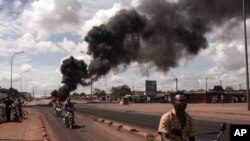Burkina Faso will reinstate an interim government led by President Michel Kafando, Benin's leader said Saturday, in what would be a victory for the street over army coup leaders.
Seeking to end violent clashes between soldiers and protesters and salvage an October presidential election, African mediators held talks with the junta head, General Gilbert Diendere.
"We may hope again," Benin's leader, Thomas Boni Yayi, told reporters after a third round of talks with Diendere. "We are going to relaunch the transition that was underway — a transition led by civilians, with Michel Kafando," he added, saying that more details of the "good news" would be provided Sunday.
Senegal's President Macky Sall, who is also mediating in the crisis as head of the Economic Community of West African States, did not comment after the talks. His office earlier confirmed he was seeking to broker Kafando's return to power.
It was not clear whether the alleged deal included amnesty for Diendere, a shadowy general who served as a spy chief under ousted President Blaise Compaore. Nor was it clear whether the election schedule could be restored.
Diendere did not deny that an initial agreement had been reached. "I always said that I will not cling to power. It's now a question of terms," he told reporters after the meeting.
Cabinet session stormed
Soldiers from the presidential guard stormed into a cabinet meeting Wednesday and abducted Kafando and ministers, disrupting a transition period due to end with elections on October 11.
Calling themselves the National Democratic Council (CND), the coup leaders oppose the interim government's plans to dissolve the presidential guard, and they claim the country faced instability after some candidates were barred from standing in the elections.
"We simply want a set of proposals that allow us to get to the elections in all peace and serenity while assuring that the results are uncontested and incontestable," Diedere told TV 5 MONDE earlier in the day.
Kafando has since been freed and is in his residence, where he met with mediators earlier in the day. He has not spoken publicly since the coup was announced Thursday.
The fate of Prime Minister Isaac Zida, a former member of the military body behind the coup, remained unknown.
With the release of most of the officials it had been holding, the CND also announced the reopening of all state borders, which had been locked down. When that news came, long lines of people formed, hoping to get through at one of the land border posts with Ivory Coast, and dozens of trucks and buses could be seen parked along the road leading to the border.
Protests continue
But these announcements did not stop the protests that had been continuing since the coup. Roadblocks made of branches and tires were set up at various points on the road from the border to Burkina's second-biggest city, Bobo-Dioulasso.
In town, citizens protested in front of a military camp to try get the soldiers to join the movement. Protester Clarisse Koura came with a spatula, intending to hit coup leader Diendere in the head. She said protesters did not want him in power.
A few hundred people gathered at one of the main squares. The crowd could be heard singing "Our homeland or death," a motto from Burkina's revolutionary figure and former president, Thomas Sankara.
In the capital, Ouagadougou, hundreds of protesters burned tires and erected barricades in the streets Saturday. Young people wielding sticks and slingshots dragged railway fences into the streets of Ouagadougou to block soldiers.
Unlike on previous days, there was no sign of soldiers from the elite presidential guard in central Ouagadougou, although residents reported sporadic gunfire in the suburbs.
The streets were nearly deserted by nightfall in compliance with a curfew.
In all, at least 10 people have been killed and more than 100 injured in street clashes with soldiers since the coup. Most of the casualties were treated for gunshot wounds.
VOA's Emilie Iob contributed to this report from Bobo-Dioulasso.





